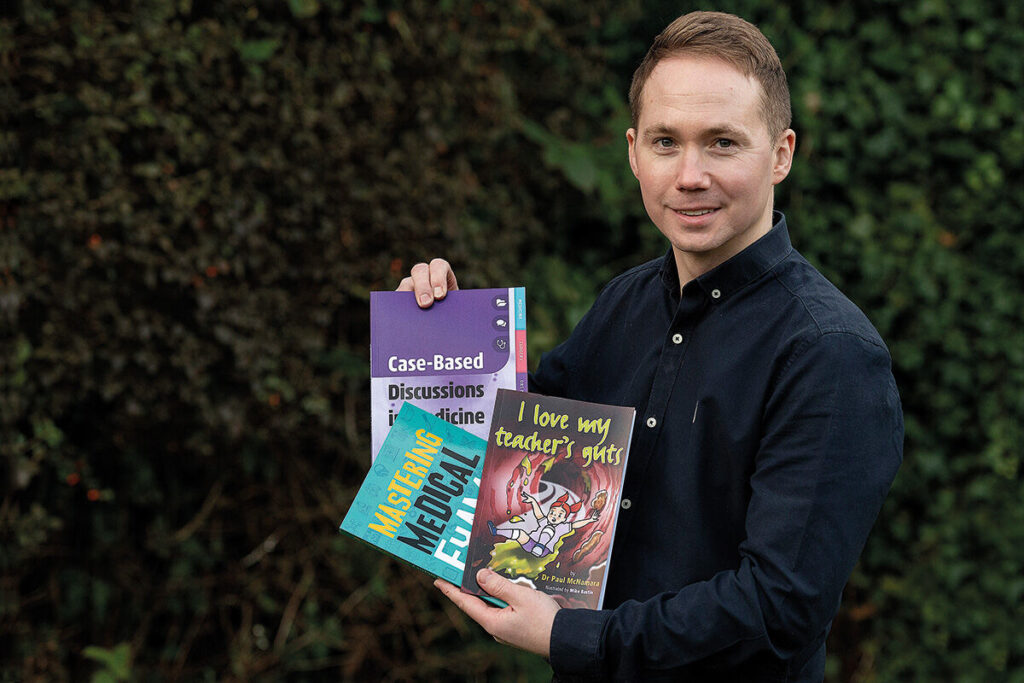Working life: Writing for the next generation

A day in the life of Dr Paul McNamara, who balances caring for patients with writing, including an educational book for children
5am
I get up, make a cup of tea and read or write. I try to make the most of the calmness before my three young daughters wake up. Come 8am the house is crazy.
I’ve always loved books. When I was studying medicine and compiling my notes, I thought I could turn them into a revision book. But it wasn’t until a decade later that I got round to it.
Shortly after publishing Mastering Medical Exams, I found joy in writing for fun. That’s when I had the idea to write an educational children’s book about the human body: I Love My Teacher’s Guts. With the help of my daughters, I came up with the concept of a girl called Sally who shrinks to the size of a microscopic particle after a science experiment goes wrong and finds herself trapped inside her teacher’s body. The book kept us busy during lockdown and is near completion.
8am
My daughters get up and I make them breakfast, usually chocolate brioche and some fruit. I then head off to clinic. I’m usually based in a Deep End GP practice in Glasgow, but I also love to work in remote and rural medicine. That’s why, today, I’m on the Isle of Islay on Scotland’s western coast.
It’s a 20-minute drive along the coast to the little surgery, which looks out to the ocean. People wave at each other when driving here – it’s known as the ‘Islay wave’ – and I often get story ideas on the way to work. Islay is such an inspiring place to be. As much as I love living and working in Glasgow, I like the change of scene.
10am
It’s a busy morning. One of my patients is an elderly gentleman who I must break bad news to. When I tell him his condition could be serious, he looks at me with tears in his eyes and thanks me for letting him know. He then leaves and says he is going fishing to clear his mind.
12:30pm
Just as I’m about to break for lunch, the elderly gentleman returns with a bucket. He gives me the bucket, which has a live lobster inside. He says it’s a thank-you gift.
I am extremely touched by the patient’s act of kindness. Being a GP can be tough, but moments like this remind us how it’s also a privilege. I cover the bucket with a dish towel and put it in my car.
1pm
As I’ve completed my paperwork, I have time to head to the beach for an hour or so. I sit there to eat lunch and add some ideas in my phone’s notes app. I check emails. My illustrator has sent pictures of the book’s protagonist Sally. My daughters told him she should have red hair and freckles. I wanted to get them involved as much as possible, and it was such good fun.
2pm
After lunch, I usually return to the surgery for afternoon clinic, but today I’m on call at the local hospital covering both the ward and A&E.
I enjoy the combination of GP work and community work. A patient presents with a tension pneumothorax, which is an emergency. He came in the previous night but because of resource limitations, there was no radiographer after 6pm. He refused to be flown off the island, so had to be managed on the ward.
7.30pm
I arrive home with the lobster. My daughters name him Gerald and beg us not to cook him. After dinner, I take the girls to bed, read them a story and tell them we’ve set the lobster free. Then my wife and I eat it for dinner. It is delicious.
9pm
Before I head to bed, I watch TV with my wife and let my mind wander. I try to envision how the book will look when it’s finished. As much as I hope it’s a hit, the main reason I want to write it is to raise money for food banks and mental health charities in Glasgow. I want to show my daughters that a little kindness can go a long way.
Profile: Dr Paul McNamara
Roles
– Salaried GP at Port Glasgow Medical Practice (Wednesday and Friday)
– Locum GP at Wellwynd Practice Airdrie (Tuesday and Thursday)
– Urgent and unscheduled care in Lanarkshire (32 hours per month)
– Honorary clinical lecturer at Glasgow University (flexible)
– Integrated care GP at Vale of Leven hospital (21 hours per month)
Click here to access Pulse’s archive of Working life features









